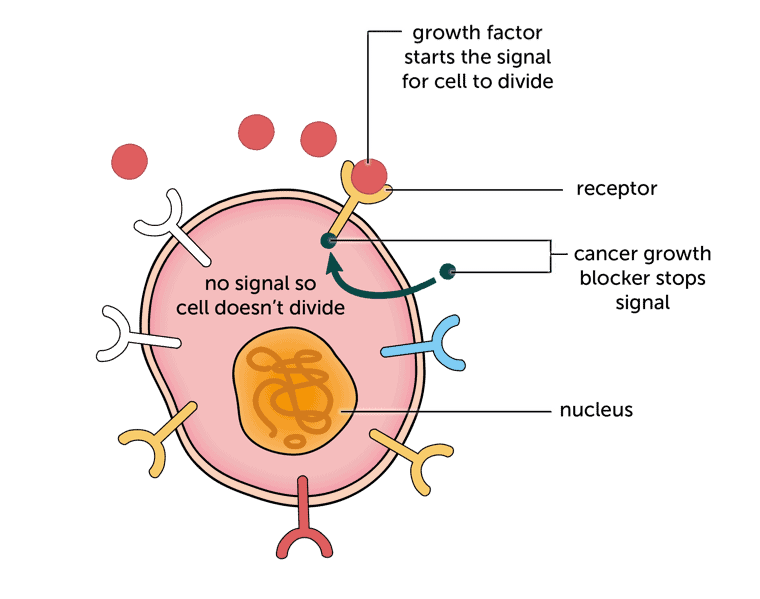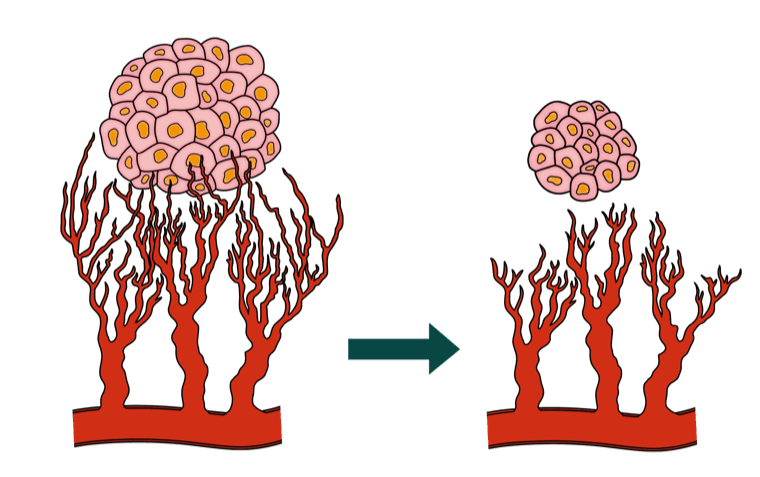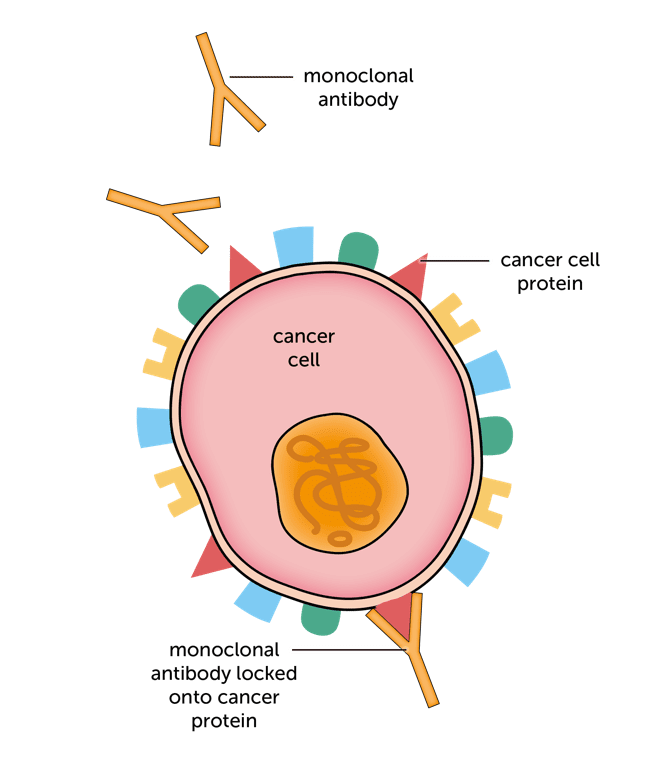These are the newest type of treatment for cancer.
What are targeted cancer drugs?
This type of treatment attacks proteins that cancer cells make to help them grow and spread. In that way, they ‘target’ the differences between cancer cells and normal cells.
As researchers have found out more about the biology of cancers, they have been able to design treatments that are specifically aimed at changes caused by altered genes (mutations) in cancer cells. Some types of targeted cancer medicines may also be called biological therapies or biologics. They are part of a treatment approach called ‘personalised medicine’ because they are chosen depending on the results of tests carried out on your own cancer cells.
How targeted treatments work
There are different types of targeted therapies and they work in different ways. You may have
- a tyrosine kinase inhibitor (TKI) or ‘growth blocker’
- an antiangiogenic, which stops cancers from growing blood vessels
- monoclonal antibodies
Cancer growth blockers or TKIs
Tyrosine kinase inhibitors or ‘cancer growth blockers’ are the type of targeted therapy most often used to treat liver cancers.
Tyrosine kinases are proteins that cells need to grow. Gene changes in cancer cells can mean that the cancer makes far too much of one or more of these proteins. (Doctors call this ‘over expression’.) That’s why cancer cells grow abnormally fast compared to normal cells.
By blocking the particular protein that is ‘over expressed’, TKIs stop cancer cells from dividing and growing. So TKIs are sometimes called cancer growth blockers.

For one of these drugs to work, your cancer cells must make too much of the protein it targets. So your doctor will send a sample of your cancer to have molecular testing. This will show whether a particular TKI will help to treat your cancer.
TKIs called sorafenib and lenvatinib are used to treat hepatocellular liver cancer. A TKI called pemigatinib is sometimes used to treat bile duct cancer.
There is more about these drugs in the sections on each of these cancers.
Blocking tumour blood supply – anti-angiogenics
All cells, including cancer cells, need a blood supply to bring them food and oxygen. The process of growing blood vessels is called angiogenesis.

An anti-angiogenic (say: an-gee-oh-gen-ick) blocks blood vessel growth. So these drugs help to cut off the cancer’s food supply and so slow down its growth.
Bevacizumab (Avastin) is an anti-angiogenic used to treat hepatocellular liver cancer (HCC).
Monoclonal antibodies
Antibodies are part of your immune system. Monoclonal just means all the same type. So a monoclonal antibody (MAB) is an antibody that is made in a laboratory in large quantities for use as a treatment.
Antibodies are able to look for specific proteins made by cells. So a MAB will help if your cancer makes the protein it targets.

Atezolizumab (Tecentriq) is a MAB used to treat hepatocellular liver cancer (HCC). It blocks a protein that stops your immune system attacking the cancer. So it’s also a type of immunotherapy.
Tests you may need
Before you have treatment with a cancer growth blocker (TKI) you need to have test on a sample of your cancer to make sure the treatment will help. There is more about this in the section above on TKIs.
If you have atezolizumab with bevacizumab (Avastin) for HCC, there is a risk of blood clots or bleeding in your digestive system. So before deciding if it’s right for you, your doctor may want to check for any signs of ulcers in your stomach or small bowel. Or for swollen blood vessels in your throat (oesophagus or gullet) and stomach, which are common in advanced liver disease.
To do this, your doctor will use an endoscope. This is a tube with an eyepiece on one end and a camera and a light on the other. After numbing your throat and giving you a sedative, your doctor puts the tube down your throat and into your stomach. They can see the inside of the throat and stomach through the eyepiece. They may call this test a gastroscopy.
Clinical Trials
Cancers starting in the liver are not very common. So doctors and researchers across the country and internationally work together to find and test new treatments in clinical trials . Your doctor may suggest a trial that they think is suitable for you. Do ask them if you’re interested in finding out about trials you may be able to join.
We have more information about finding a clinical trial.
Content last reviewed: October 2022
Next review date: October 2025
